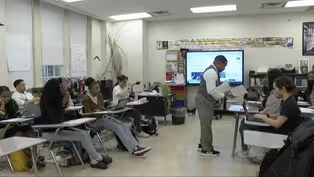
The life and legacy of Native photographer Jennie Ross Cobb
Clip: 3/26/2023 | 1m 30sVideo has Closed Captions
The life and legacy of Native photographer Jennie Ross Cobb
This Women’s History Month, we’re spotlighting figures whose contributions have often gone unseen. Tonight, we look back at the work of Jennie Ross Cobb, the first known female Native American photographer, who captured personal images of her community.
Problems playing video? | Closed Captioning Feedback
Problems playing video? | Closed Captioning Feedback
Major corporate funding for the PBS News Hour is provided by BDO, BNSF, Consumer Cellular, American Cruise Lines, and Raymond James. Funding for the PBS NewsHour Weekend is provided by...

The life and legacy of Native photographer Jennie Ross Cobb
Clip: 3/26/2023 | 1m 30sVideo has Closed Captions
This Women’s History Month, we’re spotlighting figures whose contributions have often gone unseen. Tonight, we look back at the work of Jennie Ross Cobb, the first known female Native American photographer, who captured personal images of her community.
Problems playing video? | Closed Captioning Feedback
How to Watch PBS News Hour
PBS News Hour is available to stream on pbs.org and the free PBS App, available on iPhone, Apple TV, Android TV, Android smartphones, Amazon Fire TV, Amazon Fire Tablet, Roku, Samsung Smart TV, and Vizio.
Providing Support for PBS.org
Learn Moreabout PBS online sponsorshipJOHN YANG: And for the last week of Women's History Month, we spotlight another figure whose contributions have often gone unseen.
Tonight, the first known female Native American photographer who captured personal images of her community.
Jennie Ross Cobb's, candid depictions of members of the Cherokee Nation, rarely seen by the rest of the country, cemented her place in tribal and photographic history.
The daughter of prominent Cherokee leaders, she was given a box camera in the 1890s when she was a teen and used it to capture images of her friends and family over a period of about ten years.
Her fellow students at the Cherokee National Female Seminary, friends eating snacks, playing on train tracks and her students in front of one of the Cherokee schoolhouses where she taught for several years.
They tell the story of the community the Cherokee had built after they were forced to leave their ancestral homelands in the East and of a life under threat yet again as the federal government worked to break up communally held lands to make way for railroads and non-Indian settlement.
Later in life, Cobb fought to preserve a piece of her people's heritage, campaigning to save the historic Hunter's home.
When the state of Oklahoma took it over in 1945, she became curator and restored it using her own glass plate negatives.
She remained in that position until her death in 1959 at the age of 77.
Documentary shows uphill battle for endometriosis treatment
Video has Closed Captions
Clip: 3/26/2023 | 6m 48s | ‘Below the Belt’ highlights uphill battle for endometriosis treatment (6m 48s)
What toxic ‘forever chemicals’ are and how to avoid them
Video has Closed Captions
Clip: 3/26/2023 | 6m 21s | What we know about toxic ‘forever chemicals’ and how to reduce our exposure (6m 21s)
Why so few Black men teach in American classrooms
Video has Closed Captions
Clip: 3/26/2023 | 5m 52s | Why so few Black men teach in American classrooms (5m 52s)
Providing Support for PBS.org
Learn Moreabout PBS online sponsorship
- News and Public Affairs

FRONTLINE is investigative journalism that questions, explains and changes our world.

- News and Public Affairs

Today's top journalists discuss Washington's current political events and public affairs.












Support for PBS provided by:
Major corporate funding for the PBS News Hour is provided by BDO, BNSF, Consumer Cellular, American Cruise Lines, and Raymond James. Funding for the PBS NewsHour Weekend is provided by...


